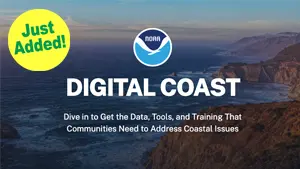
NOAA Natural Infrastructure
Natural infrastructure is the focus of this NOAA Office for Coastal Management Digital Coast website, where you’ll find numerous online and in-person training guides.
Accelerating resiliency planning in communities across the Commonwealth

Natural infrastructure is the focus of this NOAA Office for Coastal Management Digital Coast website, where you’ll find numerous online and in-person training guides.
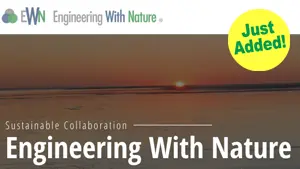
The U.S. Army Corps of Engineers (USACE) Engineering With Nature® (EWN) Initiative enables more sustainable delivery of economic, social, and environmental benefits associated with infrastructure.
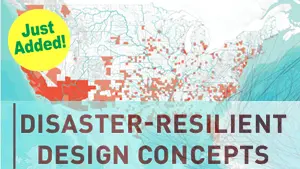
The potential for disaster increases as communities expand into hazard-prone areas and climate change alters the frequency, severity, and locations of threats. The disaster-resilient designs showcased in this document can help communities reduce the impact of disasters, recover more quickly, strengthen local economies, and create safer, more equitable places to live by reducing hazards especially for those most vulnerable.
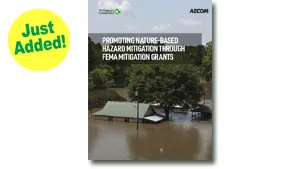
This guidance document is intended for stakeholders pursuing FEMA HMA grants for nature-based solutions to mitigate risks associated with flooding (riverine and coastal) and wildfire. Many of the HMA grant programs can fund projects that mitigate other hazards, but this document is limited in discussion to flooding and wildfire.
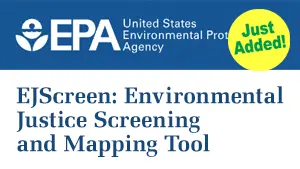
EJScreen is EPA’s environmental justice mapping and screening tool that provides EPA with a nationally consistent dataset and approach for combining environmental and socioeconomic indicators.
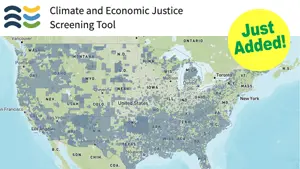
The Climate and Economic Justice Screening Tool from the Council on Environmental Quality features an interactive map and uses datasets that are indicators of burdens in eight categories: climate change, energy, health, housing, legacy pollution, transportation, water and wastewater, and workforce development.
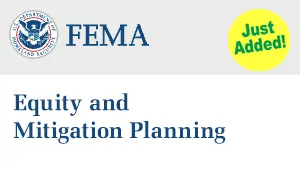
Mitigation planning creates a pathway to reduce vulnerabilities. State, local, tribal and territorial governments engage underserved communities, populations, neighborhoods, and census tracts as mitigation plans are developed and updated. Together, stakeholders participate in mitigation planning to develop and adopt mitigation solutions.
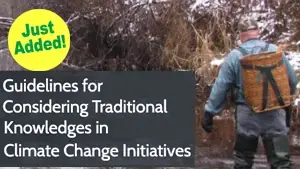
Guidelines for Considering Traditional Knowledges in Climate Change Initiatives is an informational resource for tribes, agencies, and organizations across the United States interested in understanding traditional knowledges—or TKs—in the context of climate change.

NOAA’s Digital Coast was developed to meet the unique needs of the coastal management community. The website provides not only coastal data, but also the tools, training, and information needed to make these data truly useful. Content comes from many sources, all of which are vetted by NOAA.

Natural infrastructure is the focus of this NOAA Office for Coastal Management Digital Coast website, where you’ll find numerous online and in-person training guides.

The U.S. Army Corps of Engineers (USACE) Engineering With Nature® (EWN) Initiative enables more sustainable delivery of economic, social, and environmental benefits associated with infrastructure.

The potential for disaster increases as communities expand into hazard-prone areas and climate change alters the frequency, severity, and locations of threats. The disaster-resilient designs showcased in this document can help communities reduce the impact of disasters, recover more quickly, strengthen local economies, and create safer, more equitable places to live by reducing hazards especially for those most vulnerable.

This guidance document is intended for stakeholders pursuing FEMA HMA grants for nature-based solutions to mitigate risks associated with flooding (riverine and coastal) and wildfire. Many of the HMA grant programs can fund projects that mitigate other hazards, but this document is limited in discussion to flooding and wildfire.

EJScreen is EPA’s environmental justice mapping and screening tool that provides EPA with a nationally consistent dataset and approach for combining environmental and socioeconomic indicators.

The Climate and Economic Justice Screening Tool from the Council on Environmental Quality features an interactive map and uses datasets that are indicators of burdens in eight categories: climate change, energy, health, housing, legacy pollution, transportation, water and wastewater, and workforce development.

Mitigation planning creates a pathway to reduce vulnerabilities. State, local, tribal and territorial governments engage underserved communities, populations, neighborhoods, and census tracts as mitigation plans are developed and updated. Together, stakeholders participate in mitigation planning to develop and adopt mitigation solutions.

Guidelines for Considering Traditional Knowledges in Climate Change Initiatives is an informational resource for tribes, agencies, and organizations across the United States interested in understanding traditional knowledges—or TKs—in the context of climate change.

NOAA’s Digital Coast was developed to meet the unique needs of the coastal management community. The website provides not only coastal data, but also the tools, training, and information needed to make these data truly useful. Content comes from many sources, all of which are vetted by NOAA.
In early 2025, the NOAA Office for Coastal Management released the Employment in Coastal Inundation Zones (ECIZ) Visualization Tool showing data on businesses in coastal hazard areas. The tool includes coastal hazard footprints for FEMA…
EPA invites EJ advocates to participate in its National EJ Community Engagement calls. The purpose of these calls is to inform communities about EPA's environmental justice work and enhance opportunities to maintain an…
A multi-part virtual panel series focusing on extreme heat adaptation in indigenous communities. Regional-level Solutions panel is taking place on July 15, 2025.
Learn more and register More details...
The 2025 Resilient Virginia Conference will deliver tools, information, and networking opportunities to help you build resilience and move your community forward.
The conference will include multiple opportunities for engagement via breakout sessions,…
While we’re saving the full reveal for later, here’s a sneak peek at the powerful topics and exciting experiences taking shape on this year’s Resilient Virginia Conference agenda.
We’re pleased to announce that Greg Steele, Virginia’s newly appointed Chief Resilience Officer, will deliver the opening plenary address at the 2025 Resilient Virginia Conference.
The Geos Institute plans to expand the Climate Ready America initiative into Virginia. As part of this effort, they are surveying local governments across the state to asses interest in establishing a Climate Innovation Center.
5 ways to take part in Resilient Virginia’s 6th biennial resilience conference
2025 Conference Set for July 23-24 … RVCA Launches Priority-Setting Workshops … Collaboration in Action … Resources and Funding … more.